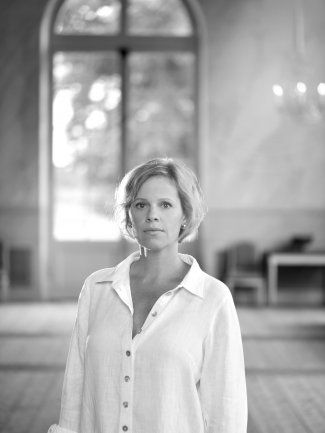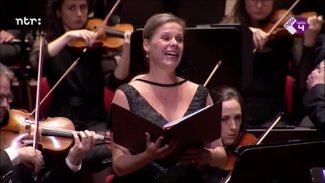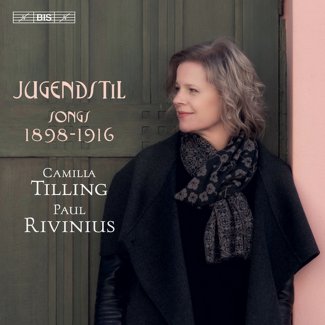




Camilla Tilling
“Tilling sounds at the height of her powers, her voice still limpid, fresh and youthful, her interpretative skills those of a mature artist.”
(The Sunday Times)
Undoubtedly one of Sweden’s most accomplished talents, Camilla Tilling’s beguiling tone and unfailing musicality have made her a firm favourite with conductors, audiences and critics alike.
Tilling is one of the world’s most sought-after concert performers with recent appearances including under Gustavo Dudamel with both Royal Concertgebouw Orchestra and Los Angeles Philharmonic Orchestra in Mahler’s Symphony No.4, under Esa-Pekka Salonen with London Philharmonia Orchestra in Schoenberg’s Gurrelieder, with Gianandrea Noseda and Washington’s National Symphony Orchestra in Beethoven’s Symphony No.9 and with Omer Meir Welber and Orchestre national de France in Dutilleux’s Correspondances. She toured extensively in Peter Sellar’s stagings of Bach’s St Matthew Passion and St John Passion with Berliner Philharmoniker and Sir Simon Rattle and had a special connection to the late Sir Bernard Haitink under whose baton she sang her first Beethoven, Missa Solemnis at Teatro alla Scala and in whose historic final concerts with Radio Filharmonish Orkest at Amsterdam’s Concertgebouw in 2019, she was his chosen Strauss soprano soloist.
Over recent seasons, Tilling has continued to expand an already impressively varied repertoire with such works as Osvaldo Golijov’s Three Songs with David Danzmayr and the Oregon Symphony Orchestra, Irgen-Jensens’ song cycle Japanischer Frühling with Christian Blex and Karajan-Akademie of Berliner Philharmoniker, Janáček’s Glagolitic Mass under the baton of Rafael Payare with Orchestre symphonique de Montréal and Mendelssohn’s Paulus with Orquesta y Coro Nacionales de España under Masaaki Suzuki.
Show more
This season, she reunites with Sir Simon Rattle for performances of St Matthew Passion with Symphonieorchester des Bayerischen Rundfunks, reprises Solveig in Bill Barclay’s staging of Peer Gynt with St. Louis Symphony under Stéphane Denève, joins Eivind Aadland and Tasmania Symphony Orchestra in Mahler’s Rückert Lieder and Donald Runnicles and Sydney Symphony Orchestra in Debussy’s La Damoiselle élue. She performs Berlioz Les nuits d’été with Norrköpings Symfoniorkester, Britten’s Les illuminations with the Arctic Philharmonic, Mendelssohn Lobgesang with Netherlands Radio Philharmonic Orchestra and, with Gävle Symfoniorkester, she reprises Daniel Nelson’s Chaplin Songs, a new work she premiered with Swedish Radio Symphony Orchestra under Andrew Manze. Alongside her many concert engagements, she returns to the Royal Swedish Opera as Contessa Almaviva in a new production of Le Nozze di Figaro by Linus Fellbom, conducted by Alan Gilbert.
Early operatic roles such as Sophie (Der Rosenkavalier), Pamina (Die Zauberflöte), Ilia (Idomeneo), Susanna (Le nozze di Figaro) and Zerlina (Don Giovanni) gave Tilling debuts at Royal Ballet and Opera, Covent Garden, Bayerische Staatsoper, Opéra national de Paris,Teatro alla Scala and The Metropolitan Opera, and as Mélisande (Pelléas et Mélisande) she performed at Teatro Real Madrid, Semperoper Dresden, Finnish National Opera and with Los Angeles Philharmonic Orchestra. More recent highlights include Donna Clara (Der Zwerg) at Bayerische Staatsoper, La Damoiselle élue at Madrid Teatro Real and Blanche de la Force (Dialogues des Carmélites) and Suor Angelica at Royal Swedish Opera.
Tilling embarked on a North American recital collaboration last season with renowned pianist Emanuel Ax presenting her acclaimed Swedish Nightingale programme ‘Jenny Lind: Love and Lieder’ and this season she joins Håvard Gimse at Troldhaugen as part of the Bergen International Festival with a programme of Edvard Grieg songs. Her impressive discography includes orchestral works by Haydn with Bernard Haitink, Handel and Purcell with Emmanuelle Haïm, Grieg with Paavo Järvi, Brahms with Marek Janowski and Cherubini with Riccardo Muti in addition to recital collections of Gluck, Mozart, Strauss, Schumann, Grieg and many other composers.
Contacts
Shirley Thomson Senior Director, VOICE at HarrisonParrott | Head of CSR
Shirley Thomson Senior Director, VOICE at HarrisonParrott | Head of CSR
General Management
Gallery
“Swedish soprano Camilla Tilling proved to be a superb advocate for these gorgeous songs [Mahler’s
Rückert Lieder]. Her warm but clear tone, vocal agility and sheer musicality was a constant delight.”
“…one was struck by Camilla Tilling’s vocal purity, fittingly echoed by the children’s choir.”
“Camilla Tilling is on ravishing form in this beautifully paced album of Romantic and Expressionist songs” [Jugendstil; BIS records]
“Camilla Tilling provided the evening’s most genuinely consoling moment, in her melting rendition of the fifth movement [in Brahms’s German Requiem]”
“It’s difficult to resist the purity of her sound, the loveliness of her pearly, bright tone…Tilling bringing beguiling tone and unfailing musicality…”
“for his farewell, Haitink conducted the Radio Philharmonic Orchestra of the Netherlands in five orchestral songs by Richard Strauss, with Camilla Tilling as a very fine soloist”
“Tilling… was rapturous in her ecstatic evocation of ‘death, the reviver of beauty’”
“In this outstandingly accomplished selection of 18th-century operatic arias, Camilla Tilling demonstrates just how rewarding such albums can be when executed with the most genuine kind of musico-dramatic artistry. The eminent Swedish soprano…[has] the sort of fine-grained delivery – in equal part vocal and verbal, whether in French or Italian – that results in a parade of ‘real people’ stepping out in three dimensions before the listener’s delighted ears. Tilling’s fresh-sounding soprano is, on this showing, a protean Classical instrument…everywhere employed with such unassailable technical mastery, such control of breath support and easy flow of phrase, that not even the extravagant high-and-low flourishes of Fiordiligi’s ‘Come scoglio’ emerge flustered or short-changed…this CD [is] a truly remarkable achievement.” *****
“her voice has expanded in its range of colours without losing the precision of the line or technique. [Tilling] gives us musical purity without ever sacrificing the text…she gives us superb recitative and dynamic mastery…A rare find.”
“Her voice remains fresh and peachy, is well-knit through its registers, and she sings with an unaffected directness, allowing the music to speak for itself” *****
“Ilia is one of Tilling’s favourite roles and she sings two of the arias, ‘Padre, germani, addio’ and ‘Zeffiretti lusinghieri’, with a silvery grace, enlivened by the occasional hint of a fast vibrato. Her Susanna and Countess are nicely differentiated, the latter’s ‘Dove sono’ touchingly inward at the reprise…’Come scoglio’ is where this disc takes off with a newly urgent sense of drama, and ‘Per pietà’ makes a virtue of her lightness of voice…Of the Gluck, the most engaging is the intensely felt ‘Che fiero momento’ of Eurydice, a role Tilling has portrayed notably on stage. It is good to have Armide’s Act 2 aria, ‘Ah! Si la liberté’, and she is deeply affecting in it…Everything here is well judged and sympathetically sung’
“‘Come scoglio’ (preceded by an excitingly incisive delivery of the ‘Temerari!’ recitative) rivets the listener; there’s security at both ends of the range, the requisite flexibility, and vivid projection of both the character’s outrage and her unquenchable fidelity.”
“It says something — not especially complimentary — about the classical record industry that this great Mozart soprano features on no complete audio recordings of Idomeneo, Le nozze di Figaro or Così fan tutte. Her accounts of Ilia’s arias from Acts I and III, Susanna’s Deh vieni, the Countess’s Dove sono and both of Fiordiligi’s arias are superior by some distance to any of those by the sopranos cast in recent complete sets. Tilling sounds at the height of her powers, her voice still limpid, fresh and youthful, her interpretative skills those of a mature artist. She sings long “instrumental” lines unbroken by breaths, yet her textual inflections — the word “Invan” (In vain), in the preceding recit to Fiordiligi’s Come scoglio, bristles with outraged indignation; the climax of the Countess’s E Susanna non vien thrills the ear with her affronted pride – illuminate character. Thirty years ago, her voice might have been considered small for Fiordiligi and Gluck’s Armide and Iphigénie, but, today, with a period-instrument orchestra, it is perfectly attuned to their dramatic accents. The two excerpts from Armide, rare on recital discs, and O malheureuse Iphigénie are special gems from a captivating disc.”
“Camilla Tilling’s clear soprano conveyed both the innocent naiveté of Mélisande and a kind of fata purity that chimed with Debussy’s unchanging musical motif employed at her every entrance.”
“Camilla Tilling is a silvery voiced Mélisande.”
“The cast here was superb…Camilla Tilling captured the seemingly lightheaded Mélisande with pretty, unstressed tone and elegantly nuanced phrasing.”
“Camilla Tilling’s singing had some moments of breathtaking purity of tone, and she presented a passive, ethereal Mélisande.”
“sung with smiling, vernal tone and an evident pleasure in the words.”
“Among the most touching moments was clear-voiced soprano Camilla Tilling’s duet on ‘Aus liebe will mein Heiland sterben’ with [the flautist], their voices exquisitely blended and balanced.”
“Camilla Tilling presented a Susanna to be reckoned with, who was obviously going to keep Figaro in his place. Her ‘Deh vieni’ was beautifully and meaningfully sung.”
“The Swedish soprano Camilla Tilling is a sparky and vocally secure Susanna, with a beautifully floated Deh vieni non tadar.”

























